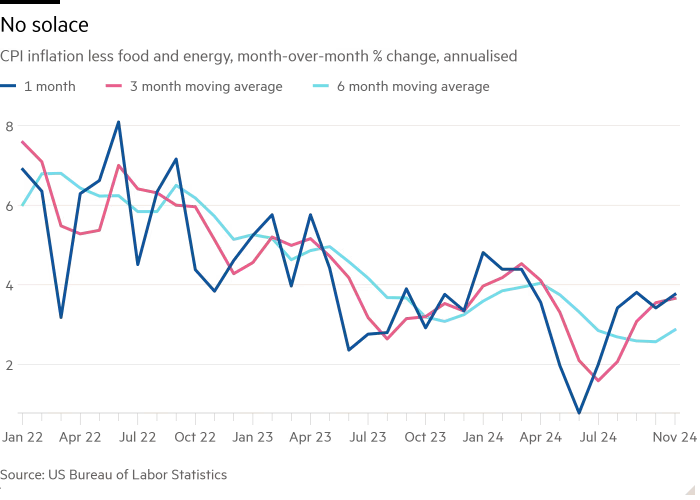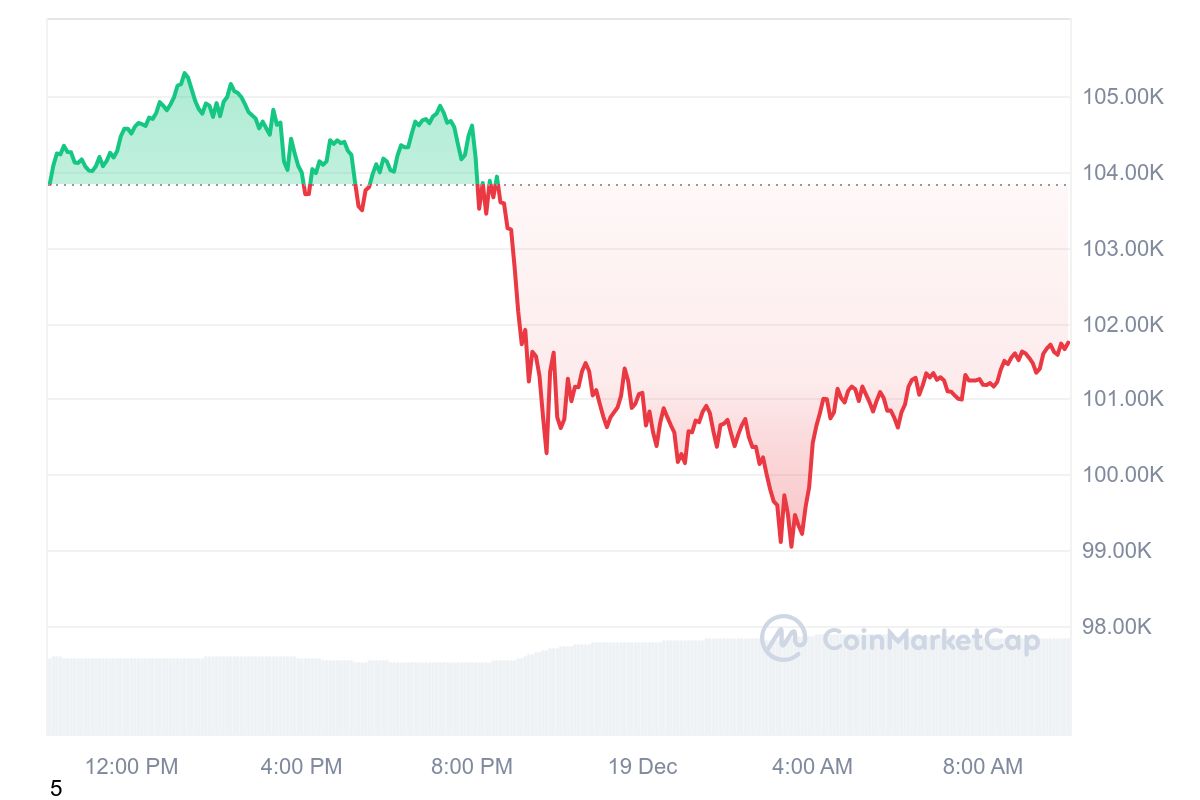كان هذا التوتر المتصاعد يختمر منذ الانتخابات، مع تزايد التكهنات حول كيفية تحديد أولويات سياسة ترامب؛ إن خفض الضرائب، وضوابط الهجرة الأكثر صرامة، وارتفاع التعريفات الجمركية، والدفع نحو تكامل الأصول الرقمية، من شأنه أن يتماشى مع مهمة مجلس الاحتياطي الفيدرالي المتمثلة في استقرار الأسعار.
تكشف تصريحات باول الأخيرة عقب اجتماع اللجنة الفيدرالية للسوق المفتوحة (FOMC) عن استعداد البنك المركزي لبيئة سياسية مليئة بعدم اليقين.
موقف باول الخفي بشأن العملات المشفرة وأسعار الفائدة
وفي اجتماع اللجنة الفيدرالية للسوق المفتوحة، خفض بنك الاحتياطي الفيدرالي سعر الفائدة بمقدار 25 نقطة أساس، كما كان متوقعًا. ومع ذلك، فقد طغت التوقعات المتغيرة للبنك المركزي على هذه الخطوة. ويتوقع ملخص التوقعات الاقتصادية الآن أن يصل سعر الفائدة إلى 3.9% بحلول نهاية العام المقبل، مما يشير إلى تخفيضين إضافيين في أسعار الفائدة. وارتفعت توقعات التضخم لعام 2025 إلى 2.5%، في حين ارتفعت حالة عدم اليقين المحيطة بتوقعات التضخم، مع نطاق أوسع من النتائج المحتملة.

تناول باول هذه التوقعات بحذر، وعزا جزءًا من عدم اليقين إلى تأثير التعريفات الجمركية المحتملة لترامب والسياسات الاقتصادية الأخرى. وقال باول: "لا نعرف متى سنواجه هذا السؤال"، مشددًا على تركيز بنك الاحتياطي الفيدرالي على دراسة كيف يمكن للتعريفات الجمركية أن تؤدي إلى التضخم.
ومع ذلك، فقد أقر بأن بعض أعضاء اللجنة الفيدرالية للسوق المفتوحة قد أخذوا في الاعتبار بشكل مبدئي التأثيرات المحتملة لسياسات ترامب، وشبهوا الوضع بـ "القيادة في ليلة ضبابية".
ورغم أن تعليقات باول تبدو محسوبة، فإن المنتقدين يزعمون أنها تنم عن انحياز سياسي. ومن خلال دمج التقديرات التخمينية لأجندة ترامب الاقتصادية في توقعاتهم، ربما يكون بنك الاحتياطي الفيدرالي قد تجاوز دوره المحايد، وهو الانتقادات التي كان ترامب ومعسكره سعداء باستغلالها.
العملات المشفرة على مفترق الطرق: لا يوجد احتياطي استراتيجي؟
لا يمكننا أن نتجاهل الفيل الكبير الموجود في الغرفة، وهي قضية مثيرة للجدل بشكل خاص: اقتراح ترامب ببناء "احتياطي استراتيجي Bitcoin ".
فقط في: 🇺🇸 يقول رئيس الاحتياطي الفيدرالي جيروم باول إن بنك الاحتياطي الفيدرالي "غير مسموح له بامتلاك Bitcoin ". #جيروم باول #FED #FOMC #InterestRates pic.twitter.com/Atq66Kl5VY
— كريبتو سيث 🌿 🦄 (@waleefin) 19 ديسمبر 2024
In a press briefing yesterday, Powell dismissed the idea outright, stating, “We’re not allowed to own Bitcoin,” while reiterating that any legal changes to permit such a reserve would require Congressional approval. The comments triggered a pullback in Bitcoin prices, which had rallied sharply post-election amid optimism over Trump’s crypto-friendly agenda.

Powell’s skepticism echoes the Fed’s broader caution toward digital assets, and we all know that Trump does not share the same sentiment. The chairman has consistently opposed the idea of federal involvement in cryptocurrencies, framing it as a matter best left to Congress.
This cautious stance places Powell at odds with Trump, who sees digital currencies as a tool for innovation and economic growth. We have to wait to see if it is a divide that could further strain the relationship between the White House and the central bank.
Make no mistake about it: Bitcoin has been around for more than a decade, and if he didn’t support it before, Fed chair Jerome Powell would never go pro-crypto.
Trump’s frustration with Fed independence
The conflict is not limited to crypto policy. Trump has a long history of criticizing Powell’s leadership, accusing the Fed of being “political” and suggesting that its rate cuts were timed to benefit electoral outcomes.
Despite his criticisms, Trump has also voiced frustration that Powell’s rate cuts did not go far enough, highlighting his desire for more influence over monetary policy.
“I feel the president should have at least a say in there,” Trump declared in August, arguing that his business acumen made him better qualified to guide rate decisions than Fed officials. This perspective further outlines Trump’s broader ambition to reshape the central bank’s independence, a move Powell has publicly opposed.
“Independent central banks typically have lower inflation,” Powell said in September, defending the existing institutional framework. He stressed the importance of insulating monetary policy from political influence, calling it “a good institutional arrangement” that benefits the public.
Political overreach or necessary reform?
Trump’s assertion that the Fed should consult him on interest rate decisions raised eyebrows across the political spectrum. Critics warn that undermining the Fed’s independence could destabilize financial markets and erode public trust in monetary policy.
Yet, Trump’s supporters, including Tesla CEO Elon Musk, argue that his push for greater oversight reflects legitimate concerns about a central bank they perceive as out of touch with Main Street.
The tension between Trump and Powell is simply a battle over who has the power to shape economic policy. Powell insists that the Fed is committed to price stability, even as it invites accusations of political bias. On the other hand, Trump’s more aggressive, interventionist stance echoes his belief in the need for a radical rethinking of monetary policy.
The stakes are undoubtedly high for both men. It could go two ways: A constructive dialogue or an outright confrontation about whose policies are the “best for America.”
From Zero to Web3 Pro: Your 90-Day Career Launch Plan